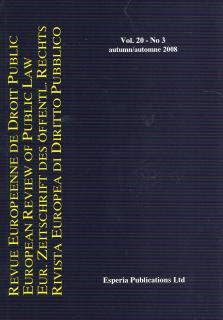
Administrative Law / Droit administratif
2005-2007
Ireland / Irlande
School of Law, University College Dublin, Dublin 4
The development of administrative law doctrine in the 2000s has been quieter and less innovative than it was during the 1990s. Instead there have occurred smaller elaborations and important restatements of established principles. Five grounds of judicial review of administrative action are analysed in this chronicle. (i) The test for reviewing whether administrative action is infected with bias continues to be elaborated. The existence of bias is determined by asking whether a reasonable onlooker would suspect bias. But how is the onlooker to be characterised? In the most recent case law the onlooker has been characterised as more exacting and less likely to excuse compromising conditions. (ii) Administrative disciplinary hearings may follow earlier criminal proceedings. English law has taken the approach that the rule against double jeopardy does not apply so as to inhibit the subsequent administrative hearing. Irish law has adopted an intermediary approach, recognising that the doctrine may apply where the evidence or charges are identical. (iii) The doctrine of legitimate expectations has been developing since the 1990s. An important advance was made when, in 2006, it was finally recognised that substantive expectations may be enforced against agencies where not to do so would constitute an ‘abuse of power’. (iv) The capacity to review administrative determinations on the grounds of evidential error has remained very underdeveloped in Irish law. However, here there have occurred some important developments (so far restricted to administrative determinations in asylum cases) where, importing standards from United States law, it has been held that a decision will be invalidated where the primary proofs do not provide a ‘rational and supportable’ foundation for the ultimate determination. (v) The issue of the effect of the invalidation of a public law or an administrative action upon a long chain of previous transactions has been considered in a recent very high profile decision of the Supreme Court. What happens where the illegality of an instrument affects a long sequence of irreversible transactions predicated on the legality of the measure? Irish law adopts a status/redress distinction. As a matter of status the measure is regarded void. Normally the individual is entitled to redress on the basis that the measure is void. However, there may be circumstances of ‘economic necessity, practical convenience, [or] public policy’ which exceptionally justify denial of redress.





















